How Does RFID Technology Revolutionize Warehouse Management? Cykeo UHF RFID Solution Helps Boost Efficiency
394Cykeo UHF RFID Solution Helps Warehouse Management Boost Efficiency
MoreAll RFID Product
The global food supply chain is a high-stakes game: 30% of produce is lost to spoilage, counterfeit organic labels cost brands billions, and consumers demand proof of ethical sourcing. Enter RFID—the quiet disruptor turning farms into data-driven ecosystems. Here’s how RFID bridges the gap between soil and shelf while boosting profits.

Food fraud affects 10% of commercial products, from diluted honey to mislabeled seafood. RFID combats this by:
Produce spoilage costs farms $1 trillion annually. RFID’s real-time visibility helps:
With 78% of consumers distrusting “organic” labels, RFID offers proof:
RFID does more than replace ear tags:

Agriculture guzzles 70% of global freshwater. RFID aids conservation:
RFID in agriculture isn’t about tech for tech’s sake—it’s about rebuilding trust. When consumers know exactly where their food comes from, and farms operate with surgical efficiency, everyone wins. For growers tired of razor-thin margins and buyers weary of empty promises, RFID is the shovel digging the path to a cleaner, smarter food future.
Cykeo UHF RFID Solution Helps Warehouse Management Boost Efficiency
MoreCykeo, a leading IoT hardware solutions provider, announces the grand opening of its Shenzhen smart factory, expanding its national production network to 25,000㎡. Explore how Cykeo leverages RFID technology, 200+ patents, and global certification...
Morehow an RFID employee tracking system transforms workplace safety and efficiency. From real-time location awareness to emergency mustering, learn how RFID helps modern teams work smarter — not harder.
MoreGet a clear answer on which type of antenna is used in an RFID tag. We explain dipole, loop, and custom designs for metal, logistics, and asset tracking.
More